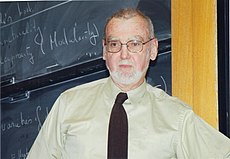Robert Langlands
Robert Langlands | |
|---|---|
 | |
| Born | October 6, 1936 |
| Nationality | Canadian/American |
| Alma mater | University of British Columbia, Yale University |
| Known for | Langlands program |
| Awards | Jeffery–Williams Prize (1980) Cole Prize (1982) Wolf Prize (1995–96) Steele Prize (2005) Nemmers Prize (2006) Shaw Prize (2007) Abel Prize (2018) |
| Scientific career | |
| Fields | Mathematics |
| Institutions | Princeton University, Yale University, Institute for Advanced Study |
| Doctoral advisor | Cassius Ionescu-Tulcea |
| Doctoral students | James Arthur Thomas Callister Hales Diana Shelstad |
Robert Phelan Langlands (/ˈlæŋləndz/; born October 6, 1936) is an American-Canadian[1] mathematician. He is best known as the founder of the Langlands program that results connecting representation theory and automorphic forms to the study of Galois groups in number theory,[2][3] for which he received the 2018 Abel Prize.
He is an emeritus professor and occupies Albert Einstein's office at the Institute for Advanced Study in Princeton.[4]
References[change | change source]
- ↑ "Robert Langlands". www.nasonline.org.
- ↑ "The Canadian who Reinvented Mathematics", Toronto Star, March 27, 2015.
- ↑ D Mackenzie (2000) Fermat's Last Theorem's First Cousin, Science 287(5454), 792-793.
- ↑ Edward Frenkel (2013). "preface". Love and Math: The Heart of Hidden Reality. Basic Books. ISBN 978-0465050741. Archived from the original on 2015-04-06.
Robert Langlands, the mathematician who currently occupies Albert Einstein's office at the Institute for Advanced Study in Princeton
